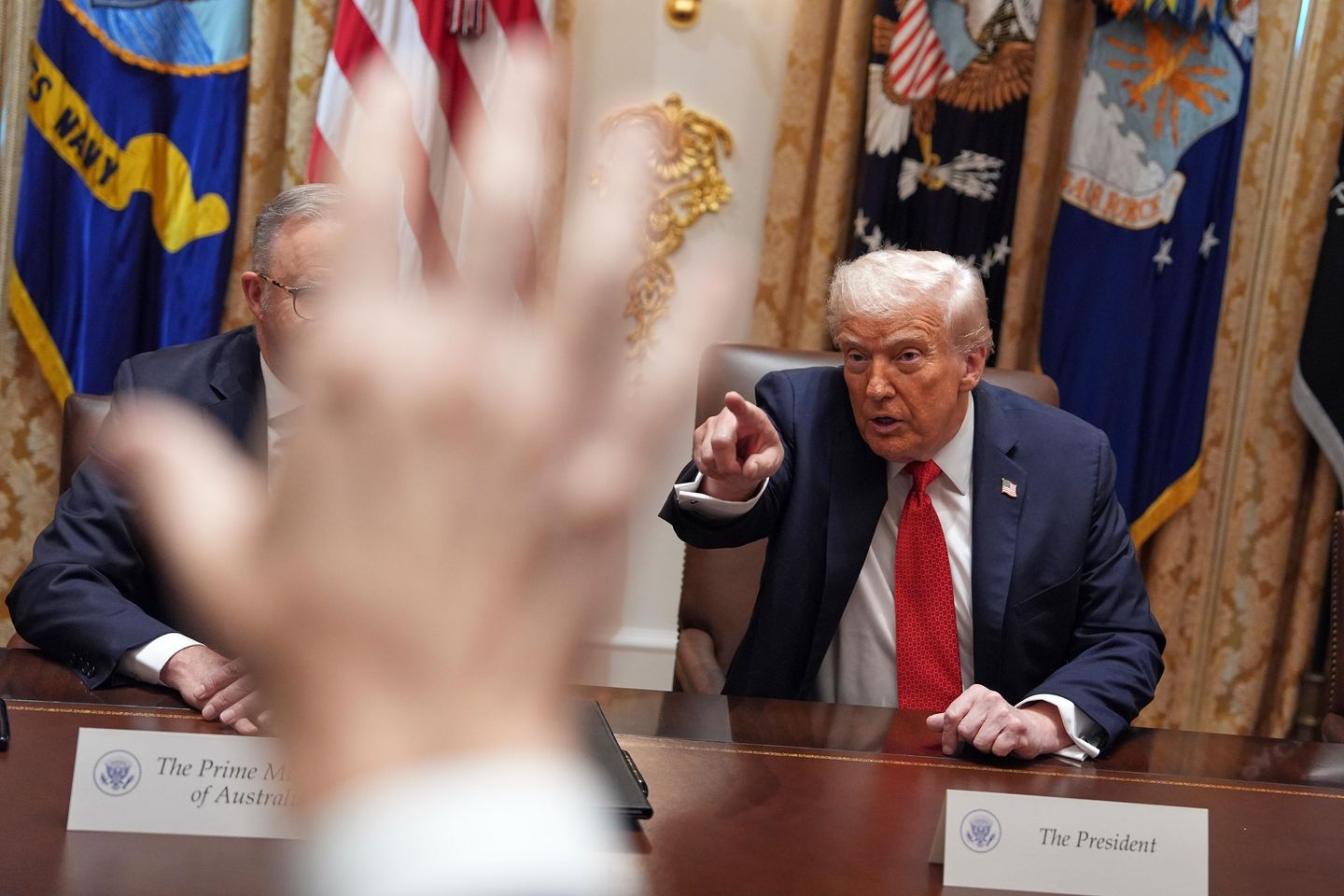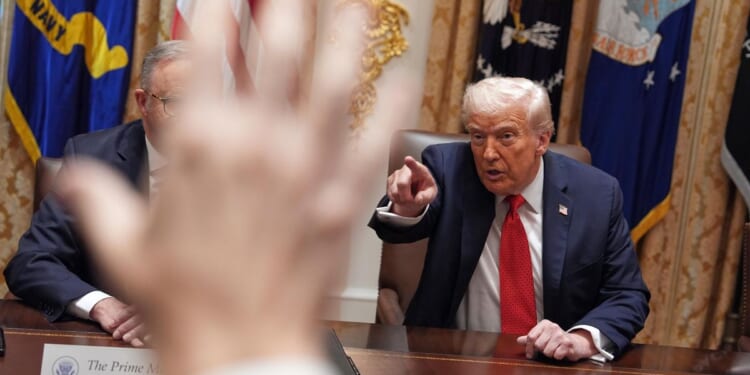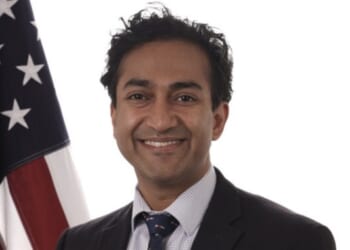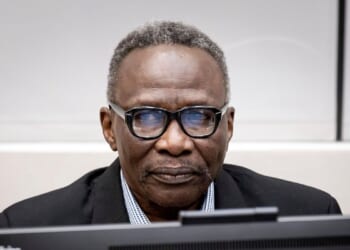
President Trump disclosed this week that talks with China could result in some type of deal on Taiwan, an unofficial U.S. ally facing the prospect of a Chinese military takeover.
Asked about reports that China is pressing him not to support formal Taiwan independence in exchange for a trade deal, Mr. Trump told reporters: “I’m not going to talk about that.”
Mr. Trump said during a press conference Monday with Australian Prime Minister Anthony Albanese that he will address the issue in a couple of weeks during a visit to South Korea, where he is scheduled to meet with Chinese President Xi Jinping.
“We’re going to be talking about a lot of things. I assume that’s going to be one of the things, but I’m not going to talk about that now,” he said of the possible Taiwan deal.
Taiwan remains a major flash point in U.S.-China relations as China’s military continues to conduct aggressive operations that U.S. military leaders have said are rehearsals for an invasion.
A Chinese Communist Party official, Wu Xinbo, said in July that Mr. Trump must first declare that the U.S. does not support formal independence for Taiwan as a concession before a summit in China can be held.
China views Taiwan as its territory and has accused the U.S. of supporting formal Taiwan independence. The U.S., however, has never recognized mainland sovereignty over the island democracy and views its legal status as unresolved.
Mr. Trump said Monday that he will meet with Mr. Xi at the Asia Pacific Economic Cooperation meeting set to begin Oct. 31, and that he plans to travel to China early next year.
Trade talks between Washington and Beijing stalled earlier this month after China announced restrictions on rare earth mineral exports.
Mr. Trump then said he would impose an additional 100% tariff on Chinese goods, in addition to the more than 55% tariff already in place.
The Trump administration also is considering restrictions on civilian aircraft parts for China’s hundreds of Boeing aircraft as part of the ongoing trade dispute, Mr. Trump said.
Mr. Trump said China has been “very respectful” and is paying large amounts of money in tariffs. “China’s paying 55% and a potential 155% come Nov. 1, unless we make a deal, and I’m meeting with President Xi,” he said. He added, “we have a very good relationship.”
“We worked out a very fair trade deal with Japan; we worked out a very fair deal with South Korea, … and I expect we’ll probably work out a very fair deal with President Xi of China … It’s going to be very exciting, and I think we’re going to work out something that’s good for both countries,” he said.
Asked about comments by Defense Secretary Pete Hegseth, who said in a speech in Singapore in May that the risk of war with China is increasing and that a Taiwan invasion could take place by 2027, Mr. Trump downplayed the danger.
The three-nation agreement between the U.S., Australia and Britain to build nuclear submarines for Australia and base U.S. and British submarines in Australia beginning in 2027 will be a deterrent to conflict with China, he said.
“But I don’t think we’re going to need it. I think we’ll be just fine with China. China doesn’t want to do that,” he said.
The U.S. is the world’s strongest military power with the best equipment and weapons, he said.
“And nobody’s going to mess with that. And I don’t see that at all with President Xi. I think we’re going to get along very well as it pertains to Taiwan and others,” he said.
Taiwan, for Mr. Xi, is probably “the apple of his eye” but “I don’t see anything happening” in terms of a conflict, Mr. Trump said.
“We have a very good trade relationship. We’re going to have a very good, I think, when we leave South Korea, it could be wrong, but I think we’ll end up with a very strong trade deal. Both of us will be happy. I don’t see that happening,” he said of a war.
Mr. Trump also noted that China is facing severe problems and said additional U.S. tariffs could cripple its economy.
At a certain point, as tariffs are boosted to 155% or more, “it’s almost like saying we don’t want to do business with you,” Mr. Trump said. “And if they don’t do business with us, I think China’s in big trouble,” he said.
“I’ll be honest with you … I don’t know that they even make it. I really do. I believe that they’re in big trouble, and I don’t want them to be in big trouble.”
Trump trolls Australia’s ambassador
Kevin Rudd, Australia’s ambassador to the United States, took a major political beating this week from President Trump over his past comments.
Mr. Trump was asked by a reporter if he had any concerns about the administration of Australian President Anthony Albanese, in light of Mr. Rudd’s remarks.
“I don’t know anything about him. If you say bad, then maybe he’d like to apologize. I really don’t know,” Mr. Trump said.
The president then turned to Mr. Albanese and asked whether the ambassador had said something bad, to which Mr. Albanese joked: “Don’t tell me, I don’t want to know.”
Mr. Trump then asked where Mr. Rudd was and whether he was still working for Mr. Albanese.
Sitting across the table in the White House Cabinet Room, Mr. Rudd was spotted and then asked by the president if he has said critical things about him.
“Before I took this position, Mr. President,” said Mr. Rudd, a former prime minister.
“I don’t like you either, and I probably never will,” Mr. Trump said.
Readers of Inside the Ring will note that last year, Mr. Rudd took issue with critics quoted in a column who said he has long held pro-China views, a position he denied in a letter to the editor.
In response, retired Navy Capt. Jim Fanell strongly disagreed. “For over two decades, Kevin Rudd has demonstrated his pro-[China] leanings,” said Capt. Fanell, a former director of intelligence for the Pacific Fleet.
“The empirical record is clear, Kevin Rudd is a ’friend of China,’ and he has consistently been a proponent of ’studying’ China while never completing his research with objective assessments about how the PRC’s has become increasingly belligerent on the world stage despite decades of unconstrained and unaccountable engagement from the West,” Capt. Fanell said.
Guermantes Lailari, a retired Air Force foreign area officer who is currently a visiting fellow at Taiwan’s National Chengchi University, said Mr. Rudd is well known among diplomats and academics for holding pro-China positions, especially related to trade.
“One academic reminded me that when the Quad [U.S., India, Japan and Australia] leaders officially met in 2007, Beijing was angered by its exclusion and then-Prime Minister Kevin Rudd withdrew Australia from the Quad after the first meeting,” Mr. Lailari said.
Mr. Rudd’s pro-Beijing stance was highlighted last year when it was revealed he had lobbied the U.S. government not to get involved or sponsor a Pacific island policing initiative that would help coordinate anti-crime efforts among the islands, apparently fearing the initiative would upset Beijing.
Chinese communist, PLA playing cards a hit
One of the hottest tickets in military and policy circles focused on China affairs these days are four sets of playing cards featuring senior Chinese Communist Party leaders and People’s Liberation Army generals and admirals, military weapons and organizations.
The decks are the work of the Air Force’s specialty think tank, the China Aerospace Studies Institute. The think tank regularly produces eye-opening reports and assessments on all things related to the Chinese military, especially its air and space forces.
The cards come in four decks with one deck of leaders making Chinese President Xi Jinping the ace of spades. The other decks are divided into CCP and PLA equipment, services and concepts and organizations.
They harken back to the Defense Intelligence Agency’s 2003 deck of playing cards featuring most-wanted Iraqis sought by the military. As of January, all but four of the 52 most wanted, including ace of spades Saddam Hussein, have been killed or captured.
The 54 CCP and PLA leaders — among them two jokers — are shown with photos and positions in a 2024 deck that includes many of the numerous high-ranking admirals and generals who have been purged under Mr. Xi’s ongoing loyalty and anti-corruption drive.
Among those in the deck that have been ousted are PLA Gen. He Weidong, the six of spades, and the ousted vice chairman of the Central Military Commission, the CCP organ that controls the military. Adm. Miao Hua, the CMC’s chief ideologist, is the four of spades. Both were formally expelled from the CCP this week. Fired Defense Minister Dong Jun is on the two of spades.
The two jokers in the deck are Gen. Wang Chunning, commander of the People’s Armed Police, and Gen. Zhang Hongbing, the PAP political commissar.
The equipment deck includes the PLA’s long-range nuclear-capable bomber, the H-6, as the ace of spades and the Type 003 aircraft carrier, its third flattop, as the ace of hearts. The ace of clubs is the silo-based nuclear missile the DF-5A/B/C, and the J-20 stealth fighter is the king of spades.
The services and concepts deck features the PLA air force as the ace of spades along with 53 other key military organizations and functions, including the three of spades as “Xi Jinping Thought,” the personal communist ideology of Mr. Xi centered on himself as the “core.”
The PLA’s organizations deck is made up of more than 50 key military units and organizations, including the Eastern Theater Command, as the four of hearts. That command is closely watched as the military forces that would be the lead in any future invasion of Taiwan.
• Contact Bill Gertz on X @BillGertz.











